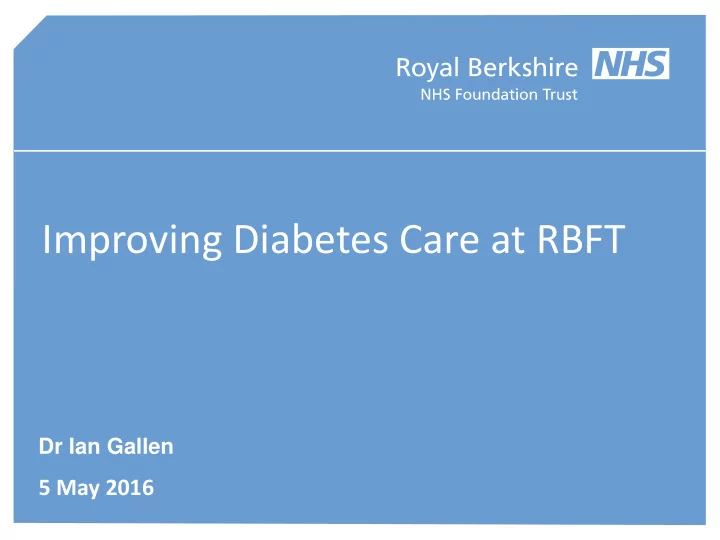

Improving Diabetes Care at RBFT Dr Ian Gallen 5 May 2016
What is Diabetes? • Diabetes is a common life-long health condition. There are 3.5 million people diagnosed with diabetes in the UK and an estimated 549,000 people who have the condition, but don’t know it. • Type 1 • Type 2 • Secondary to other diseases • Rare types
Why does management of diabetes matter? • Without appropriate self, professional support and access to best treatments, diabetes is associated with – Early death – Life altering complications • Blindness • Kidney failure • Limb amputation • Pain • And many other problems • Which are largely avoidable
Need for Change? • Local - Poor performance in care processes and cost/outcomes - Glycaemic control was poor (46.8% vs. 56.8% nationally achieving HbA1c<60mmol/mol) - 2 x progression to renal replacement, and high DKA admission - Majority of care provided at GP practices by GPs and Practice nurses, unsupported - No community DSNs - Insufficient capacity in diabetes centre • National - Increasing incidence - Increasing obesity - Increase in frail elderly - Need to reduce hospital admissions and develop other pathways of care 4
Redesign of services • External consultancy • Local champion appointed • Stakeholder network established • Collaboration across organisational boundaries: acute trust, CCGs, community provider, public health, patients 5
Service developments • Structured patient education - X-PERT for Type 2 - DAFNE for Type 1 - CarbAware 3-hour carbohydrate counting courses for Type 1 patients • Care planning - 3 local HCPs trained to deliver training and facilitate implementation of the House of Care model • HCP education: Foundation Course, plus an advanced course in injectable therapies called PITstop • Deployment of DSNs to the community (1 for each of the 4 CCGs) • Care pathway and treatment guidelines development • Introduction of Eclipse , a cloud-based IT system to facilitate audit, risk stratification and provide a patient portal • Website for patients, carers and HCPs www.berkshirewestdiabetes.org.uk • Appointment of a specialist diabetes consultant in the community - Virtual clinics in GP surgeries providing case review and HCP education - Seamless contact for GPs and practice nurses for advice 6 • 2 new RBH consultants and reconfigure secondary services to focus on “super - 6”
Care for Diabetes in Berkshire West Metrics & monitoring - Eye screening 3 rd sector support Stakeholder network Eclipse - DUK Dietetics Podiatry Monthly newsletter Care planning HCP Education DAFNE Community specialist Virtual clinics X-PERT Diabetes Specialist Nurses CarbAware 7 Website Talking health Meds management Website Coherent commissioning led by network supported by Central Support Unit
What services does RBFT offer • Emergency and post emergency care for people with diabetes • Melrose House (recent CQC review reports as excellent) – Specialist diabetes clinics – Insulin pump and continuous glucose monitoring – Adult education • Specialist services – Foot clinics – Vascular services – Pregnancy services – Dialysis 8
CarbAware course for Type 1 DM • Problem - 600 people with T1DM needed adult education to improve control in Berkshire West - DAFNE started but is limited by cost and staff - Difficult to attend a 5 day course • Solution - Designed and delivered a structured 3 hour group teaching program • So far - 65 courses, 320 participants 9
HCP Education • Foundation course - developed by local team - 66 attendees both GPs and PNs • PITstop – national injectable therapies initiation course delivered locally with local DSN mentor, 54 attendees • Half-day workshops – facilitated by MDT to meet the needs found in local surveys: oral therapies, insulin optimisation, renal diabetes 10
Virtual Diabetic Clinic • MDT in practice to review diabetes cases - Patients who require review identified by Eclipse. Highest priority is patients with very poor diabetic control (HbA1c>85mmom/mol) • Outcome of the virtual clinic recorded for implementation in the care planning process - Reviews of therapy - Adult education - Review by the DSNs in practice - Review by specialist or Bariatric team 11
Progress to date • Mean HbA1c reduction of 5.35mmol/mol between 06/12 and 06/14 (60.49 to 55.14 mmol/mol) • Proportion achieving HbA1c <60mmol/mol increased from 46.5% (06/12) to 57.6% (06/14) • Initial data shows HbA1c reduction of 18% among X-PERT attendees: 67.5mmol/mol before course, 55.5mmol/mol 6 months after X-PERT • Proportion achieving total cholesterol <5mmol/l increased from 46.3% (06/12) to 79.2% (06/14) • Proportion achieving BP ≤ 140/85 from 66.2% (06/12) to 78.0% (06/14) • Prescribing savings of £805,000 since 2012 resulting from the reversal in the trajectory of increasing cost of diabetes medications: - £313 (2011/12) - £283 (2012/13) 12 - £269 (2013/14)
Achievement of 8 care processes by CCG 2010-2013 (NDA data) 13
Treatment target achievement rate for all 8 care processes 2010-2013 (NDA data) 14
Development plans • Elderly and housebound • Diabetes in pregnancy • Young person with diabetes • Increasing provision for insulin pump treatment • “Frequent Flyer“ hypoglycaemia service • Islet cell transplant satellite service • New services for young Type 2 diabetes 15
Conclusion • Massive improvement in diabetes care in Berkshire • But as diabetes becomes more common, and treatments become more complex need – More specialist in diabetes, especially nursing staff – More space, Melrose house need to be expanded 16
Recommend
More recommend